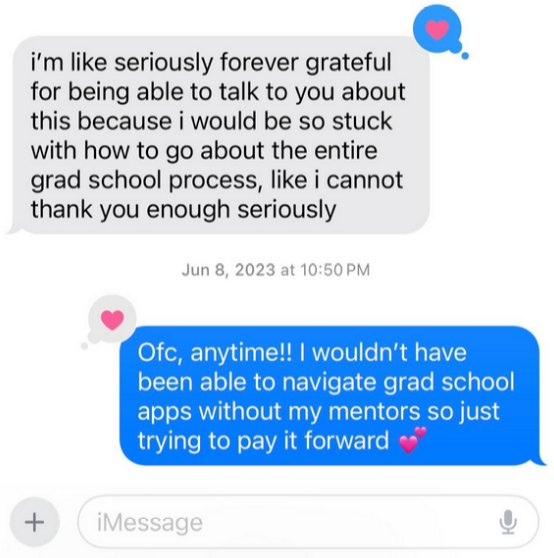The Power of Minority Visibility in OT
Have you ever met a Muslim occupational therapist? If you live in the West like me, chances are you probably haven’t. A quick Google search of how many occupational therapy practitioners are Muslim in my local area yielded me 0 results. This small exercise that you can try yourself reveals the lack of Muslim representation in the American occupational therapy labor force, despite Islam being the fastest growing major religion in the world.
Enter me, a visibly Muslim occupational therapy student in training based in Michigan. Here’s how minority visibility led me to the wonderful profession of occupational therapy.
The Power of Minority Visibility in Occupational Therapy
My journey to occupational therapy began in May 2020. Before then, I had never heard of the profession. I was undecided about my future career when I happened to stumble across an article in my university’s news feed. It was about scholarship winner Fabiha Nishat, an occupational therapy student who planned to bring occupational therapy to underdeveloped countries.
I Immediately read the whole article. Looking back, I have to admit that the only reason I opened that article was because I instantly saw myself reflected in Fabiha’s student photo —she was a Muslim, Hijab-wearing, Bengali-American girl, just like me. At that time, I didn’t know any OT students or clinicians, let alone one who shared my cultural and religious background. I may never have learned about OT, let alone pursue this largely hidden profession, had it not been for minority representation in the media. After reading the article and learning more about occupational therapy, I thought to myself that if someone who looked like me could break into this profession, then maybe I could, too.
How Mentorship Helped Me Thrive in OT School
I emailed Fabiha after reading her article and asked if she would be willing to answer a few questions I had about occupational therapy and OT school. She agreed and became a mentor to me, helping me learn more about this impactful profession and proofreading my graduate school application essays.
Soon after, I discovered a campus-wide health sciences mentorship program offered by my university for first-generation students like me. I applied and was matched with a mentor who was in OT school at the time. She introduced me to the Coalition of Occupational Therapy Advocates for Diversity (COTAD), a national nonprofit organization dedicated to promoting diversity, equity, inclusion, antiracism, and anti oppression in occupational therapy. COTAD has become like a second family to me throughout OT school. She also helped me apply to and win tens of thousands of dollars in OT scholarships that I probably never would have been aware of had it not been for her guidance. This is why I’ve come to believe that everyone can benefit from a mentor.
Now I serve as a mentor in the same program, guiding two pre-OT students through the daunting graduate school application process. It’s one of my small ways of giving back to first generation students like me.

Screenshot from a conversation with one of my pre-OT student mentees
Even now as a Level II fieldwork student on track to graduate from OT school this December, I still benefit from mentorship through the COTAD Mentorship Program. Through this free program, I was matched with a talented mentor who shares my cultural background. From her, I have learned so much about advocating for myself as a fieldwork student, prioritizing self-care, and navigating the post-graduation job search. In many ways, my COTAD mentor has become a role model to me. I hope to give back by becoming a mentor in the program when I finish my time as a mentee this year.
Key Takeaways From My OT Mentorship Experiences
I consider myself very lucky to have found incredible mentors every step of the way—from being a pre-OT student to being an OT student on the cusp of graduation. I have benefitted leaps and bounds from multiple mentors all at different stages of their professional careers. A good mentor truly can make all the difference in your OT school experience and beyond, especially for OT students who come from disadvantaged backgrounds. If you don’t have a mentor already, I recommend seeking one out in your program or through your professional organizations..
As I wrap up fieldwork and OT school, I am looking forward to seeking out more mentorship when I become a new practitioner from an OT who is just a few steps ahead of me. I also cannot wait to mentor more pre-OT students and take on a few OT students under my wing, too. That’s the enduring beauty of mentorship—it can become a source of mutual benefit to everyone who gives it a chance.
Shanmin Sultana is a third-year Occupational Therapy Master’s student at Wayne State University in Michigan. Her leadership and on-campus roles included serving as Co-Chair of her program’s COTAD chapter, ASD Representative for her program’s SOTA chapter, Student Representative for AJOT, volunteer teaching assistant, graduate research assistant, and active committee member with a national COTAD committee. Shanmin is currently completing her Level II Fieldwork placement in hand therapy while working part-time as an Executive Assistant for an OT entrepreneurship business. She is passionate about educating occupational therapy practitioners and students about cultural sensitivity with Muslim and South Asian student, clinician, and client populations. She is also passionate about helping OT students graduate with less debt through her passion project, @The_Scholarship_OT, on Instagram. Outside of her role as a student, Shanmin enjoys nature walks, doing henna art, painting, and giving back to the profession through service projects.